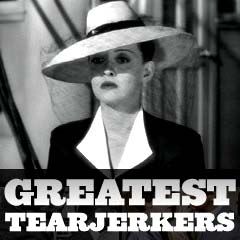|
The Greatest Tearjerkers of All-Time
|
|
Title Screen
|
Movie Title/Year and Brief Tearjerker Scene Description |
Screenshots
|

|
Gallipoli (1981, Australia)
 #21 #21
 #45 #45
- the senseless, suicidal bayonet
charge scene of young Australian soldiers against impenetrable
Turkish trenches in 1915, when message
running soldier Frank Dunne (Mel Gibson) arrived just a few moments
too late, and let out a scream of despairing anguish, knowing that
a friend and other companions would be senselessly killed
because of miscommunications and bad timing. They were all mowed
down by Turkish machine guns as they charged ahead
- before
charging the guns, accompanied by Tomaso Albinoni's mournful Adagio
in G Minor for Strings and Organ, Frank's friend Archy Hamilton
(Mark Lee) chanted the mantra that his track coach and uncle Jack
(Bill Kerr) used while training him: ("What
are your legs? Springs, steel springs. What are they gonna do?
They're gonna hurl me down the track. How fast can you run? As
fast as a leopard. How fast are you gonna run? As fast as a leopard.
Then let's see you do it...")
- the film's conclusion with the
famous death moment of Archy - captured in freeze-frame
at the instant of his death when riddled by bullets - the image slowly
faded to black
|

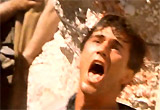
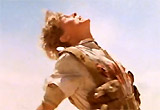
|

|
Ghost (1990)
 #9 #9
 #5 #5
- the scene in an alleyway of Sam Wheat's (Patrick
Swayze) unexpected murder while Molly Jensen (Demi Moore) cradled
his bloody body in her arms
- the moving scene at the pottery
wheel - to the tune of the Righteous Brothers' Unchained
Melody -
in which spirit-ghost/lover Sam tried to reveal himself to the grieving
Molly at her pottery wheel
- the scene of
spiritualist medium Oda Mae Brown (Whoopi Goldberg) who convinced
the bereaved Molly that Sam was trying to contact her by using
Sam's favorite expression:
"Ditto"
- in the finale, Sam kissing Molly and bidding her
goodbye before he passed on into The Light of heaven:
(Molly: "Sam?" Sam: "Molly." Molly: "I
can hear you. Oh, God." (They kissed. He bid
goodbye to spiritualist Oda Mae.) Sam: "I love you, Molly. I've
always loved you." Molly (tearfully): "Ditto." Sam: "It's
amazing, Molly. The love inside, you take it with you. See ya." Molly:
(responding likewise) "See ya. Bye.")
|



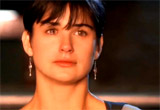
|

|
The Ghost and Mrs. Muir (1947)
- the scene in which ghostly sea captain and lover
Daniel Gregg (Rex Harrison), Gull Cottage's former owner who had
been haunting the bedroom and thoughts of Lucy Muir (Gene Tierney)
in his non-flesh-and-blood form, bid good-bye to her while she slept,
telling her that she must find her own way in life - and that she
had only been dreaming of a sea-captain haunting the house: ("You've
made your choice, the only choice you could make. You've chosen life
and that's as it should be. And that's why I'm going away, my dear.
I can't help you now...You must make your own life amongst the living,
and whether you meet fair winds or foul, find your own way to harbor
in the end...It's been a dream, Lucia")
- the transcendent
ending many years later in which white-haired, elderly widow Lucy
died in her British seaside cottage's chair when captain Daniel Gregg
reappeared, and greeted her with outstretched hands: ("And
now, you'll never be tired again, come Lucia, come my dear"). Rejuvenated
and young again, she walked off, hand-in-hand with him downstairs
and through the front door into the afterlife with him
|




|

|
Gladiator (2000)
 #98 #98
- the death scene of the moving last moments of condemned,
enslaved Colosseum gladiator "The Spaniard"
(Russell Crowe), who had earlier revealed himself as vengeful General
Maximus Meridius. In the arena during one-on-one combat with treacherous
Emperor Commodus (Joaquin Phoenix), he had already been stabbed with
a stiletto (causing punctured lungs) and was slowly dying. Weary
from his own wounds, Maximus saw visions of himself entering into his
home's wooden gates in the afterlife. Before dying, he ordered Quintus
(Tomas Arana):
("Free my men, Senator Gracchus is to be reinstated. There was a
dream that was Rome. It shall be realized. These are the wishes of Marcus
Aurelius")
- as Maximus succumbed in the arms
of Commodus' sister Lucilla (Connie Nielsen), his own ex-lover,
he told her (his final words): "Lucius
is safe." She urged him to go to his dead family: "Go to
them." As he perished, his body floated upwards and he experienced
visions of his family in the afterlife as they greeted him on a dusty
road and he waded through waving yellow reeds. She reassured that
he had greeted them: "You're home."
- Lucilla's words to everyone after Maximus' death:
("Is Rome worth one good man's life? We believed it once. Make
us believe it again. He was a soldier of Rome. Honor him.")
Fellow gladiators surrounded Maximus and carried his body out of the
arena
- the film's conclusion in which
newly-freed gladiator Juba (Djimon Hounsou) buried Maximus' two
small statues of his wife and son in the dirt of the Colosseum
where he had died: ("Now we
are free. I will see you again, but not yet. Not yet")
|

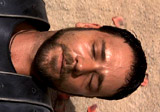
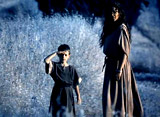

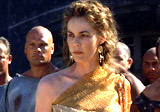
|

|
Glory (1989)
 #16 #16
- the film's moving score by James
Horner accompanied by the Boys Choir of Harlem
- the bull-whipping scene in which rebellious runaway
soldier Trip (Denzel Washington) was punished - his back scarred
from repeated lashings after being tied to a cart wheel - on false
charges of desertion (he was looking for his shoes) with his steely
eyes locked on white regiment leader Col. Robert Gould Shaw (Matthew
Broderick) as a single tear flowed down his right cheek
- the confrontation between ex-gravedigger
Sgt. Major Rawlins (Morgan Freeman) and the angry Trip: (Trip: "So
the white man give you a couple ot stripes, next thing you know,
you hollerin' and orderin' everybody around like you the massa
himself. Nigger, you ain't nothin' but the white man's
dog." Rawlins: "And what are you? So full of hate you just wanna
go out and fight everybody, 'cause you've been whipped and chased
by hounds. Well, that might not be livin', but it sure as hell
ain't dyin'. And dying's what these white boys been doin' for goin'
on three years now. Dyin' by the thousands. Dyin' for you, fool!
I know, 'cause l dug the graves. And all the time I'm diggin',
I'm asking myself, 'When?' When, O Lord, is it gonna be our time?'
Time's comin' when we're gonna have to ante up. Ante up and kick
in like men. Like men! You watch who you call a nigger. If there's
any niggers around here, it's you. Smart-mouth, stupid-ass, swamp-runnin'
nigger. If you ain't careful, that's all you ever gonna be")
- the unit's pre-battle campfire spiritual
scene in which Rawlins
led the soldiers in prayer and singing - including Trip's confession:
("I ain't much about no prayin' now. Uh, I ain't never had
no family and kilt off my Mama...Well, I just, you know, uhm, y'all's--
y'all's. Y'all's the onliest family I got...And uh, I love the
54th")
- the
stirring battle-cry "Give 'em Hell, 54" shouted by Union
soldiers (led by screenwriter Kevin Jarre) as the Massachusetts 54th
Regiment marched to launch a doomed suicidal assault on Fort Wagner
in South Carolina
- Shaw's self-reflective moment as he looked out
over the sea one last time and freed his horse
- the scene of the
frenzied assault on Fort Wagner after the men had been stirred
by the death of Shaw in the midst of them, and
the wounded Trip picking up the flag and the charge before he fell
together with his commander
- the regiment's progress as far as the
inner sanctum, but ultimately destroyed and obliterated by the interior
cannons
- the final image
of Shaw's burial in a mass beach grave with his soldiers (including
Trip next to him) - and the end credits shot of "The Robert Gould Shaw and 54th Regiment
Memorial" relief sculpture by August Saint-Gaudens in Boston
Common
|



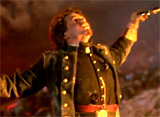


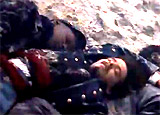

|

|
 The Godfather, Part II (1974)
The Godfather, Part II (1974)
- abused and embittered wife Kay Corleone's
(Diane Keaton) denouncement speech of her crime boss husband Michael (Al
Pacino) regarding their marriage, admitting she'd had an abortion: ("Oh!
Oh, Michael, Michael, you are blind. It wasn't a miscarriage. It
was an abortion. An abortion, Michael, just like our marriage is an abortion,
something that's unholy and evil! I didn't want your son, Michael. I wouldn't
bring another one of your sons into this world! It was an abortion, Michael!
It was a son, a son, and I had it killed because this must all end!")
|

|

|
Godspell (1973) (aka Godspell:
A Musical Based on the Gospel According to St. Matthew)
- the scene in which Jesus (Victor Garber)
wordlessly bid all of his disciples farewell as he went into the garden
to pray, knowing it was for the last time, as the aching, yearning
song
"On the Willows" (From Psalm 137) was sung by the cast on
the soundtrack
|

|

|
Gold Diggers of 1933 (1933)
- the surprisingly poignant tribute
to the travails of the common man during The Great Depression number: "Remember
My Forgotten Man", sung by Carol King (Joan Blondell) and
by a group of down-trodden tenement housewives
- the poignant number of the "Forgotten Man" undercut
in the film's conclusion by the militaristic, gung-ho marching
tribute to the United States
|
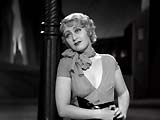

|
